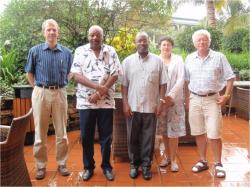Project 2: Access
 Project Title
Project Title
|
The cost-effectiveness of home-based management of malaria using artemether- lumefantrine (Coartem®): a comparative study in two areas of high and low malaria transmission in rural Uganda. |
Project Location(s)
| Rukungiri district, Uganda |
Lead Principal Investigator
|
Siân Clarke, London School of Hygiene and Tropical Medicine, Keppel St, London, WC1E 7HT, UK. Sian.clarke@lshtm.ac.uk; tel. +44 (0)207 299 4642, + 44 (0)776 665 4045 Richard Ndyomugyenyi, National Malaria Control Programme, Ministry of Health, Kampala, Uganda. richardndyomugyenyi@yahoo.com tel. +256 (0)772 457 980 |
Other Principal Investigators
|
Pascal Magnussen, DBL Institute for Health Research and Development, Faculty of Life Sciences, Copenhagen University, Frederiksberg, Denmark. pma@life.ku.dk; tel. +45 35 33 14 36. http://www.dbl.life.ku.dk/ Kristian Schultz Hansen, London School of Hygiene and Tropical Medicine, Keppel St, London, WC1E 7HT, UK. Kristian.Hansen@lshtm.ac.uk |
Research Aim(s)
| Access; Targeting |
Project Background and Rational
|
Most malaria deaths occur with 48 hours of onset of symptoms, and in rural areas with poor access to health facilities, home management of malaria (HMM) can improve the timeliness of treatment and reduce malaria mortality by up to 50%. In order to maximize both coverage and impact, ACTs should be deployed in HMM programmes, as well as in formal health facilities. Up to 80% of malaria cases are treated outside the formal health sector and shops are frequently visited as the first (and in some cases only) source of treatment. Strategies to deploy ACTs in Africa thus also need to examine the role of shops in home management and to ensure that drugs sold are appropriate. The current practice of presumptive treatment of any febrile illness as malaria (both at health facilities and in the context of HMM) based solely on clinical symptoms without routine laboratory confirmation, results in significant over-use of antimalarial drugs. With ACT being a more costly regimen, it is important to be more restrictive in its administration and rapid diagnostic tests (RDTs) provide a simple means of confirming malaria diagnosis in remote locations lacking electricity and qualified health staff. This study therefore proposes to evaluate the feasibility, acceptability, and cost-effectiveness of using RDTs to improve malaria diagnosis and treatment by community drug distributors. The acceptability of this approach will be evaluated in both low and high transmission areas. This study aims to examine the cost-effectiveness of ACT in the home management of malaria (HMM) in a range of transmission scenarios, comparing two approaches - (i) current practice where HMM is based on clinical symptoms without any laboratory confirmation, and (ii) HMM following rapid diagnostic test (RDT). |
Current Status of Project
|
A cluster-randomised trial of use of RDTs in home management of malaria is being undertaken in Rukungiri district, SW Uganda. Villages were randomized to receive home management of malaria with RDTs for use in diagnostic testing of children presenting with fever to confirm malaria prior to ACT treatment. Villages in the control arm receive home management of malaria with a presumptive diagnosis based on signs and symptoms. All community medicine distributors (CMDs) in villages participating in the trial are supplied with ACTs, and rectal artesunate for pre-referral treatment of severe malaria. The trial commenced in May/June 2010 and is being undertaken in two sub-counties which differ in the level of malaria transmission. To date, a total of 28327 children have been registered by CMDs since the start of the intervention, with 23250 patients and 1845 patients seen in the high and low transmission areas, respectively. The proportion of caretakers seeking treatment within 24 hrs after onset of symptoms high at more than 80% in both high and low malaria transmission areas. CMDs' adherence to RDT results has remained high at more than 95% in both transmission areas. The trial has now entered the final full evaluation phase with household interviews to aiming to capture data on treatment costs borne by the household, adherence to ACTs by caretakers of the children, uptake of referral advice for cases of severe malaria, as well as for cases with other illnesses which are not malaria and cannot be treated by CMDs. |

